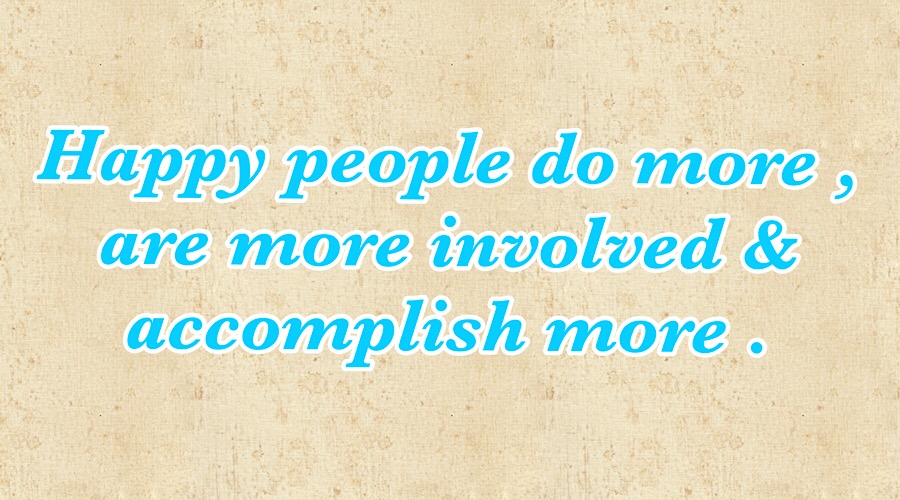Introduction .
Happiness , Positive Emotions & Well Being .
This are terms that define our Quality of Life .
Here you’ll find their definitions , how do they relate to
each other & to what extent they effect our daily life .
Even if our definition of Happiness is different , we all
realize it’s importance , in our life .
Who doesn’t want to be happier & share Happiness
more often ?
Happiness is subjective .
Click here to learn how you can enhance yours .
Happiness – Definition .
Happiness – Definition : Pleasant , positive emotions , that
an individual experiences at a present moment .
Since it’s subjective , it can be expressed & rated , by a wide range
of synonymous terms : contentment , joy , bliss , glee , elation , etc. .
Happiness originated from the word : Happy .
The original meaning was : good fortune or prosperity .
Interesting how the definition evolved , from a personal state of
accomplishment in life to positive emotions .
What determines Happiness ?
According to Positive Psychology , positive emotions , on their own ,
don’t make an individual happy . They represent only the affective
part of the equation . The other essential part is the individual positive ,
cognitive evaluation of his / her life , at that point in time .
This is the idea behind the term : Subjective Well Being .
It explains , why in researches , Subjective Well Being & Happiness
are being used alternately .
Professor Sonja Lyubomirsky created an approximate model of :
About 50 % – Of our ability to become happy is genetic ;
10 % – Are life circumstances , which describe all aspects of our life ;
40 % – Is intentional activity , which is our approach to life . The way
we act & behave , on the pursuit of our life goals .
The Greek word Eudaimonia is defined in philosophy , as the
individual’s right intentional activity . The kind of activity that leads
to a positive Well Being .
Why is Happiness important ?
Happiness rises at a certain present moment , in our life , & then fades ,
till the next time . Fleeting .
As the poet , Robert Frost said : ” Happiness makes up in height for what
it lacks in length ” .
What’s left are positive emotions .
Professor Barbara Fredrickson , researched & found that positive
emotions effect us in two ways :
1. They open us , by enhancing the boundaries of our minds & our hearts .
Our perception of our environment widen & our peripheral vision increases :
– Let us see more opportunities & possibilities ;
– Turn us more creative : develop more ideas & make better decisions ;
– We become more resilient to both , failures & health issues ;
– Help us become more sociable , involved & trustworthy .
2. They transform us , biologically , & bring out the best in us .
Science research found that emotions effect the level of the cellular change
in our bodies . Since , 1% of the human cell count renew every 24 hours ,
a whole body renewal takes about 100 days .
Change an individual’s level of positive emotions is possible , but difficult .
It’s a continual process , that requires a lifestyle change , a strong will , self
control & a great effort .
Well Being .
Professor Martin Seligman , the father of Positive Psychology , developed
the theory of Well Being . The theory consists of 5 components , that an
individual must have & nourish in order to flourish in life . The P.E.R.M.A. .
The stepping stone was his theory about Happiness .
The theory suggests that an individual must apply his best traits , on a daily
basis , in order to create a good life for himself .
The Happiness theory consists of 3 components :
P positive emotions – All the emotions that are connected & lead to positive
results . Not only Happiness ; Satisfaction , Pride , Awe etc. . Subjective .
E engagement – The individual’s engagement in activity , that draws his / her
interest & complete attention to a Flow . Flow is a mental state , defined
as a complete absorption of the individual in the activity . Absorption to a point
of loosing senses of time & space . Subjective .
M meaningful life – The reason behind the individual’s daily conduct . Which
entities , larger than himself , does he / she serve ? like :Family , Community ,
Country , etc. .
In 2011 , nine years later , Professor Seligman published the P.E.R.M.A. .
He explained that the Happiness theory was a single dimension . It was too
dependent on the individual’s mood & didn’t include enough components .
The P.E.R.M.A. added two more components :
R relationships – Building relationships is inevitable part of the human
experience . Positive relationships support the other four components .
A accomplishments – Whether private or public based , accomplishments are
realization of the individual’s life goals & Achievements . Accomplishments
also support the other four components .
Professor Seligman added that each component should be :
1. Defined & measured on it’s own ;
2. Pursued , by individuals , on it’s own .
Happiness , Subjective Well Being & Well being .
Conclusion – Each of the terms is a stand alone . Happiness & Subjective
Well Being are key components in the perception of Well Being .
Since Well Being can be defined & measured , it’s being used , by international
organizations , to compare between countries .


Comments are closed.